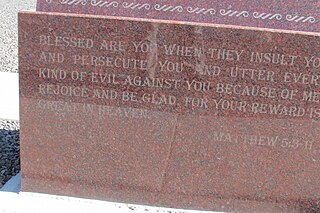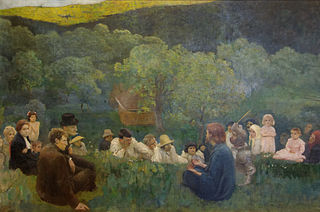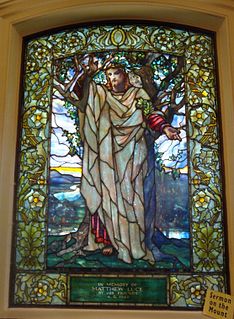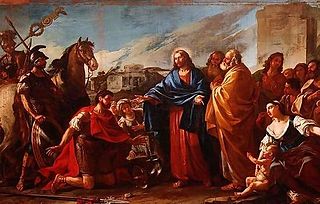
The Second Epistle of John, often referred to as Second John and often written 2 John or II John, is a book of the New Testament attributed to John the Evangelist, traditionally thought to be the author of the other two epistles of John, and the Gospel of John. Most modern scholars believe this is not John the Apostle, but in general there is no consensus as to the identity of this person or group.

Matthew 3:9 is the ninth verse of the third chapter of the Gospel of Matthew in the New Testament. The verse describes an incident where John the Baptist berates the Pharisees and Sadducees. He has previously called them a brood of vipers and warned them of the wrath to come and has urged them to repent. In this verse he warns that their links to Abraham will not save them.

Matthew 4:13 is the thirteenth verse of the fourth chapter of the Gospel of Matthew in the New Testament. In the previous verse Jesus returned to Galilee after hearing of the arrest of John the Baptist. In this verse he leaves from Nazareth to Capernaum.

Matthew 5 is the fifth chapter of the Gospel of Matthew in the New Testament. It contains the first portion of the Sermon on the Mount, which will also take up chapters 6 and 7. Portions are similar to the Sermon on the Plain in Luke 6, but much of the material is found only in Matthew. It is one of the most discussed and analyzed chapters of the New Testament. Warren Kissinger reports that among Early Christians no chapter was more often cited by early scholars. The same is true in modern scholarship.

Matthew 5:11 is the eleventh verse of the fifth chapter of the Gospel of Matthew in the New Testament. It is the ninth verse of the Sermon on the Mount. Some consider this verse to be the beginning of the last Beatitude, but most disagree. They see it as more of an expansion on the eighth and final Beatitude in the previous verse.

Matthew 5:15 and Matthew 5:16 are the fifteenth and sixteenth verses of the fifth chapter of the Gospel of Matthew in the New Testament. They are part of the Sermon on the Mount, and is one of a series of metaphors often seen as adding to the Beatitudes. The previous verse compared the disciples to a City upon a Hill that can't be hidden. These verses present a similar analogy.

Mark 2 is the second chapter of the Gospel of Mark in the New Testament of the Christian Bible. In this chapter, the first arguments between Jesus and other Jewish religious teachers appear. Jesus heals a paralyzed man and forgives his sins, meets with the disreputable Levi and his friends, and argues over the need to fast, and whether or not one can harvest food on Sabbath.

Matthew 5:46 is the forty-sixth verse of the fifth chapter of the Gospel of Matthew in the New Testament and is part of the Sermon on the Mount. This is the third verse of the final antithesis, built on the commandment "Love thy neighbour as thyself". Jesus here gives another example of why one most love one's enemies.

Matthew 6:1 is the first verse of the sixth chapter of the Gospel of Matthew in the New Testament and is part of the Sermon on the Mount. This verse begins the discussion of how even good deeds can be done for the wrong reasons.

Matthew 6:17 is the seventeenth verse of the sixth chapter of the Gospel of Matthew in the New Testament and is part of the Sermon on the Mount. This verse continues the discussion of fasting.

Matthew 6:18 is the eighteenth verse of the sixth chapter of the Gospel of Matthew in the New Testament and is part of the Sermon on the Mount. This verse concludes the discussion of fasting.

Matthew 6:25 is the twenty-fifth verse of the sixth chapter of the Gospel of Matthew in the New Testament and is part of the Sermon on the Mount. This verse shifts the discussion from one of money to one of worry.

Matthew 6:30 is the thirtieth verse of the sixth chapter of the Gospel of Matthew in the New Testament and is part of the Sermon on the Mount. This verse continues the discussion of worry about material provisions.

Matthew 6:31 and Matthew 6:32 are the thirty-first and thirty-second verses of the sixth chapter of the Gospel of Matthew in the New Testament and is part of the Sermon on the Mount. This verse continues the discussion of worry about material provisions.

Matthew 6:33 is the thirty-third verse of the sixth chapter of the Gospel of Matthew in the New Testament and is part of the Sermon on the Mount. This verse continues the discussion of worry about material provisions.

Matthew 7:6 is the sixth verse of the seventh chapter of the Gospel of Matthew in the New Testament and is part of the Sermon on the Mount.

Matthew 7:11 is the eleventh verse of the seventh chapter of the Gospel of Matthew in the New Testament and is part of the Sermon on the Mount. This verse summarizes the preceding metaphors in favour of prayer.

Matthew 28:9 is the ninth verse of the twenty-eighth chapter of the Gospel of Matthew in the New Testament. This verse is part of the resurrection narrative. Mary Magdalene and "the other Mary" are leaving the empty tomb of Jesus after encountering an angel, and in this verse they encounter the risen Jesus.

Matthew 8:8 is the eighth verse of the eighth chapter of the Gospel of Matthew in the New Testament. This verse continues the miracle story of healing the centurion's servant, the second of a series of miracles in Matthew.

Matthew 8:11 is the eleventh verse of the eighth chapter of the Gospel of Matthew in the New Testament. This verse is part of the miracle story of healing the centurion's servant, the second of a series of miracles in Matthew. After praising the Gentile Centurion's faith in the previous verse in this one Jesus prophesizes that many form around the world will follow him.




















